Business Law Report: Parliament, Companies, and Employment Law
VerifiedAdded on 2020/10/22
|14
|4128
|253
Report
AI Summary
This report provides a detailed overview of business law in the UK, focusing on parliament sovereignty, the sources of law (statutory, common, and equity), and the role of government in the law-making process. It examines the impact of company, employment, and contract laws on business operations, including legal formation, funding, and management procedures for different business structures (incorporated and unincorporated). The report also includes case studies to illustrate the application of business law principles, offering insights into legal solutions for various business problems. The content includes an introduction, detailed sections on key legal concepts, and a conclusion summarizing the main points.
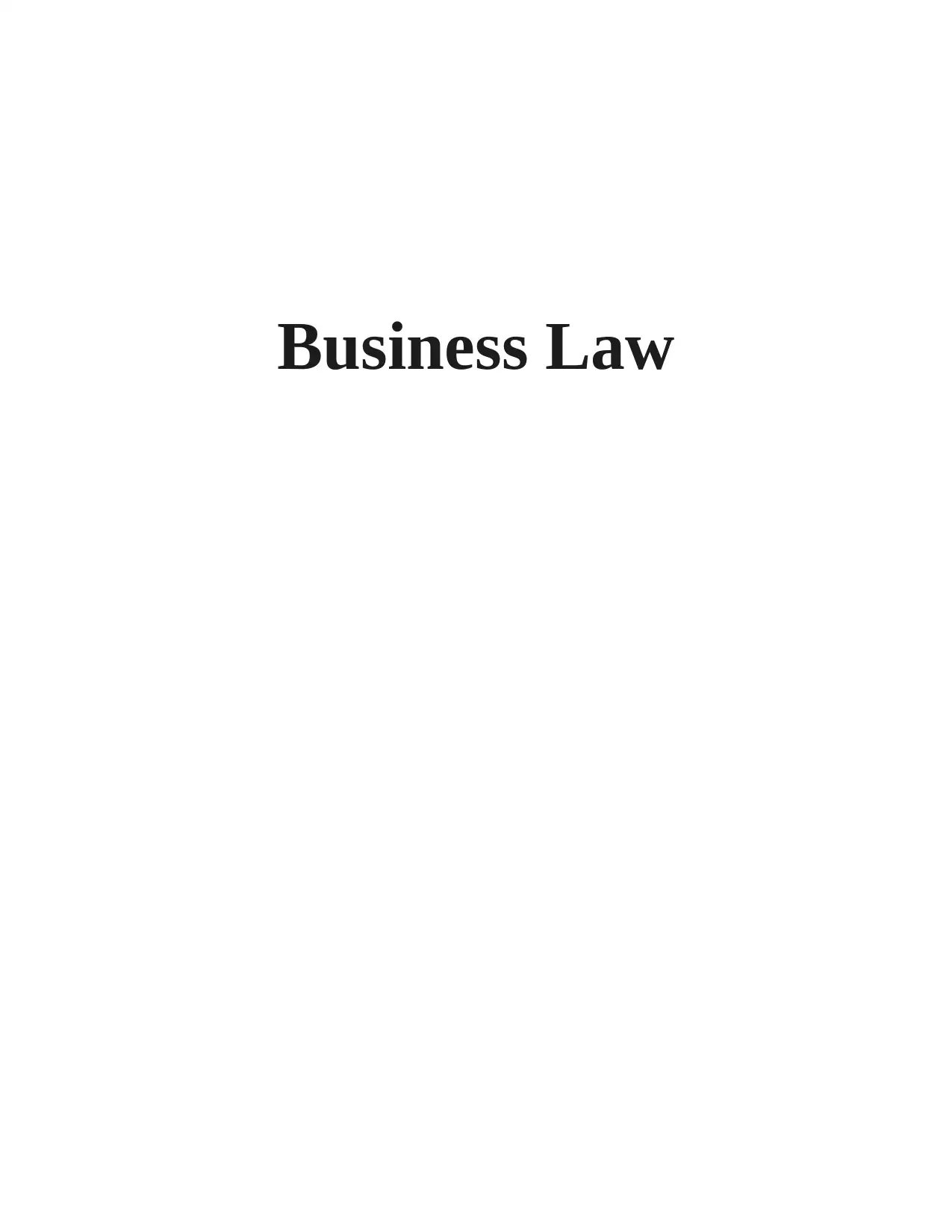
Business Law
Paraphrase This Document
Need a fresh take? Get an instant paraphrase of this document with our AI Paraphraser
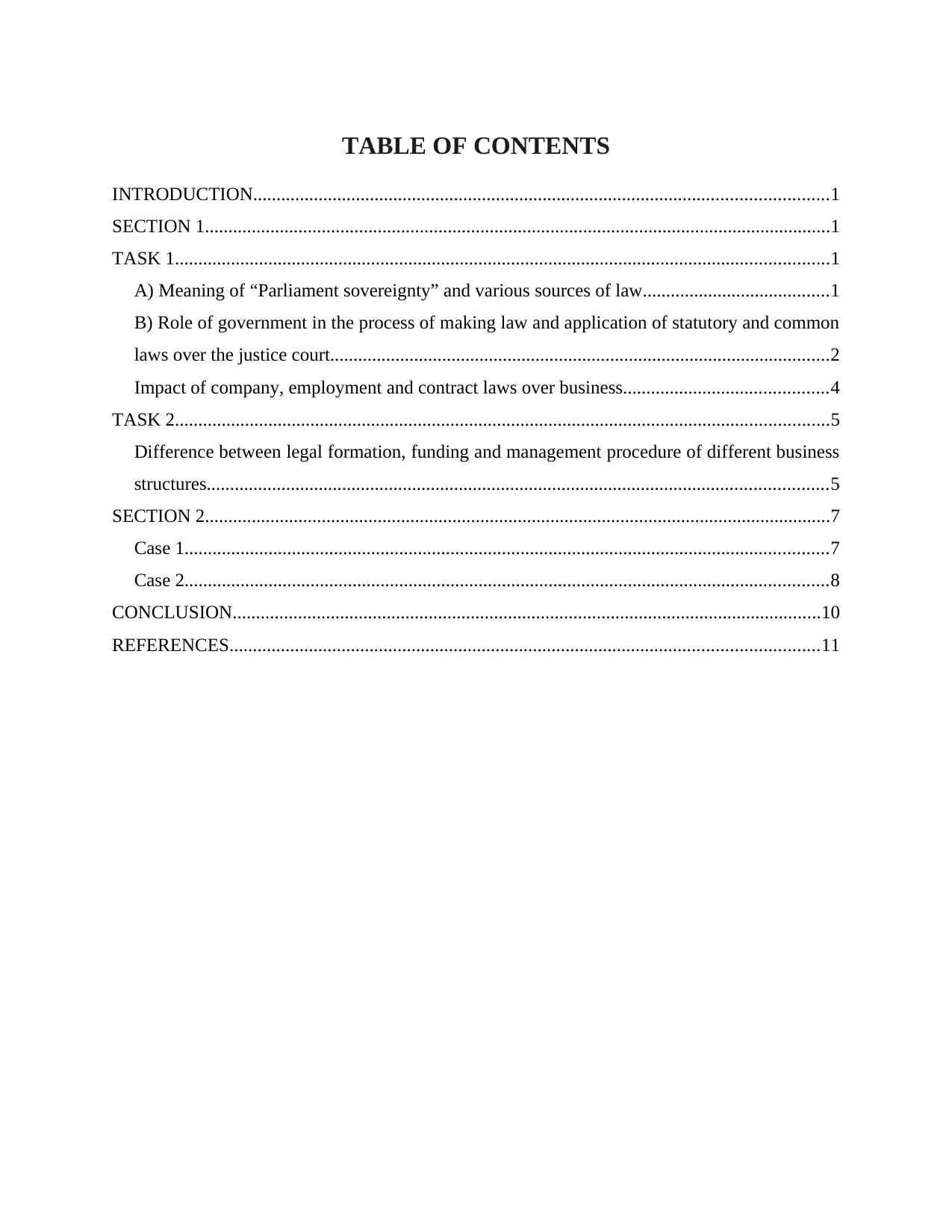
TABLE OF CONTENTS
INTRODUCTION...........................................................................................................................1
SECTION 1......................................................................................................................................1
TASK 1............................................................................................................................................1
A) Meaning of “Parliament sovereignty” and various sources of law........................................1
B) Role of government in the process of making law and application of statutory and common
laws over the justice court...........................................................................................................2
Impact of company, employment and contract laws over business............................................4
TASK 2............................................................................................................................................5
Difference between legal formation, funding and management procedure of different business
structures.....................................................................................................................................5
SECTION 2......................................................................................................................................7
Case 1..........................................................................................................................................7
Case 2..........................................................................................................................................8
CONCLUSION..............................................................................................................................10
REFERENCES..............................................................................................................................11
INTRODUCTION...........................................................................................................................1
SECTION 1......................................................................................................................................1
TASK 1............................................................................................................................................1
A) Meaning of “Parliament sovereignty” and various sources of law........................................1
B) Role of government in the process of making law and application of statutory and common
laws over the justice court...........................................................................................................2
Impact of company, employment and contract laws over business............................................4
TASK 2............................................................................................................................................5
Difference between legal formation, funding and management procedure of different business
structures.....................................................................................................................................5
SECTION 2......................................................................................................................................7
Case 1..........................................................................................................................................7
Case 2..........................................................................................................................................8
CONCLUSION..............................................................................................................................10
REFERENCES..............................................................................................................................11
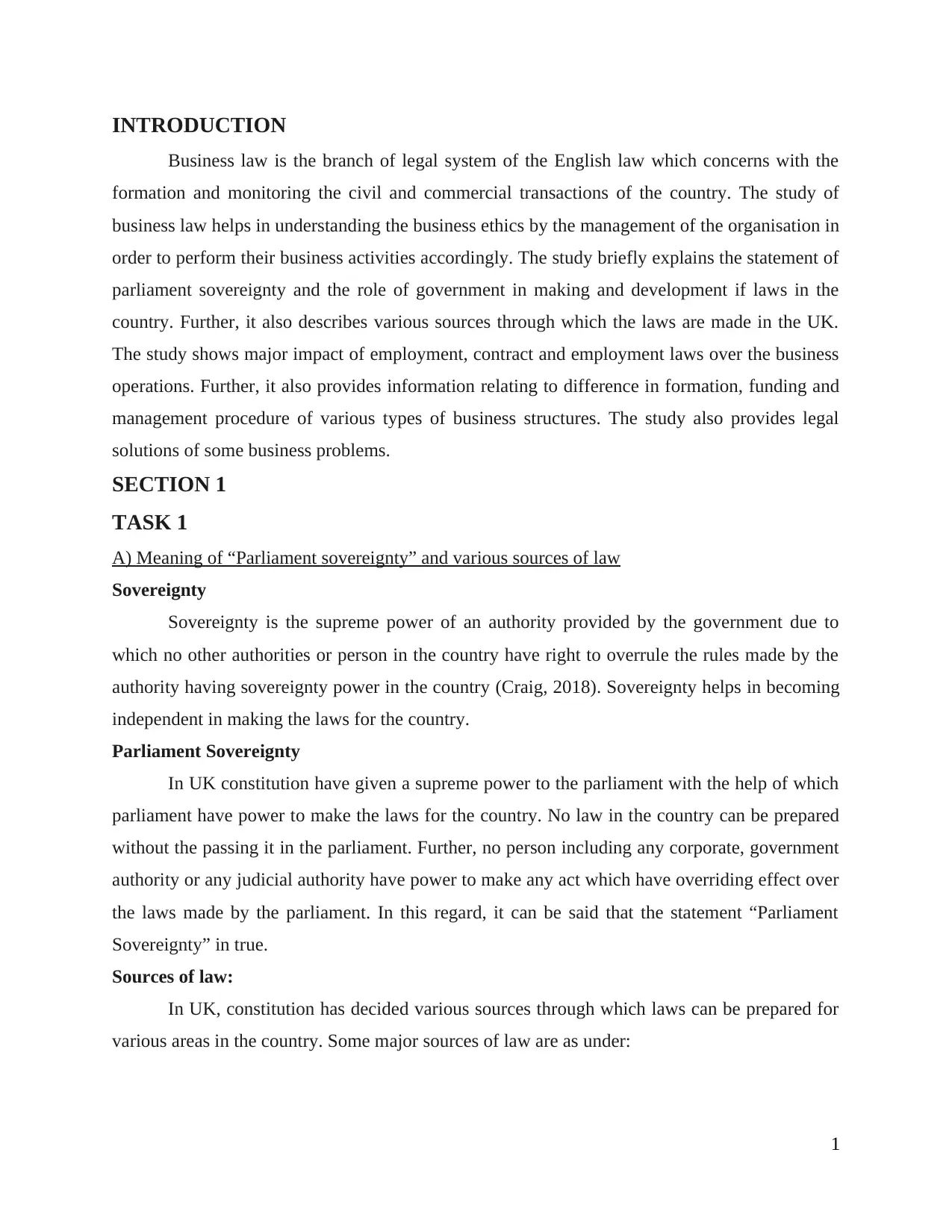
INTRODUCTION
Business law is the branch of legal system of the English law which concerns with the
formation and monitoring the civil and commercial transactions of the country. The study of
business law helps in understanding the business ethics by the management of the organisation in
order to perform their business activities accordingly. The study briefly explains the statement of
parliament sovereignty and the role of government in making and development if laws in the
country. Further, it also describes various sources through which the laws are made in the UK.
The study shows major impact of employment, contract and employment laws over the business
operations. Further, it also provides information relating to difference in formation, funding and
management procedure of various types of business structures. The study also provides legal
solutions of some business problems.
SECTION 1
TASK 1
A) Meaning of “Parliament sovereignty” and various sources of law
Sovereignty
Sovereignty is the supreme power of an authority provided by the government due to
which no other authorities or person in the country have right to overrule the rules made by the
authority having sovereignty power in the country (Craig, 2018). Sovereignty helps in becoming
independent in making the laws for the country.
Parliament Sovereignty
In UK constitution have given a supreme power to the parliament with the help of which
parliament have power to make the laws for the country. No law in the country can be prepared
without the passing it in the parliament. Further, no person including any corporate, government
authority or any judicial authority have power to make any act which have overriding effect over
the laws made by the parliament. In this regard, it can be said that the statement “Parliament
Sovereignty” in true.
Sources of law:
In UK, constitution has decided various sources through which laws can be prepared for
various areas in the country. Some major sources of law are as under:
1
Business law is the branch of legal system of the English law which concerns with the
formation and monitoring the civil and commercial transactions of the country. The study of
business law helps in understanding the business ethics by the management of the organisation in
order to perform their business activities accordingly. The study briefly explains the statement of
parliament sovereignty and the role of government in making and development if laws in the
country. Further, it also describes various sources through which the laws are made in the UK.
The study shows major impact of employment, contract and employment laws over the business
operations. Further, it also provides information relating to difference in formation, funding and
management procedure of various types of business structures. The study also provides legal
solutions of some business problems.
SECTION 1
TASK 1
A) Meaning of “Parliament sovereignty” and various sources of law
Sovereignty
Sovereignty is the supreme power of an authority provided by the government due to
which no other authorities or person in the country have right to overrule the rules made by the
authority having sovereignty power in the country (Craig, 2018). Sovereignty helps in becoming
independent in making the laws for the country.
Parliament Sovereignty
In UK constitution have given a supreme power to the parliament with the help of which
parliament have power to make the laws for the country. No law in the country can be prepared
without the passing it in the parliament. Further, no person including any corporate, government
authority or any judicial authority have power to make any act which have overriding effect over
the laws made by the parliament. In this regard, it can be said that the statement “Parliament
Sovereignty” in true.
Sources of law:
In UK, constitution has decided various sources through which laws can be prepared for
various areas in the country. Some major sources of law are as under:
1
⊘ This is a preview!⊘
Do you want full access?
Subscribe today to unlock all pages.

Trusted by 1+ million students worldwide
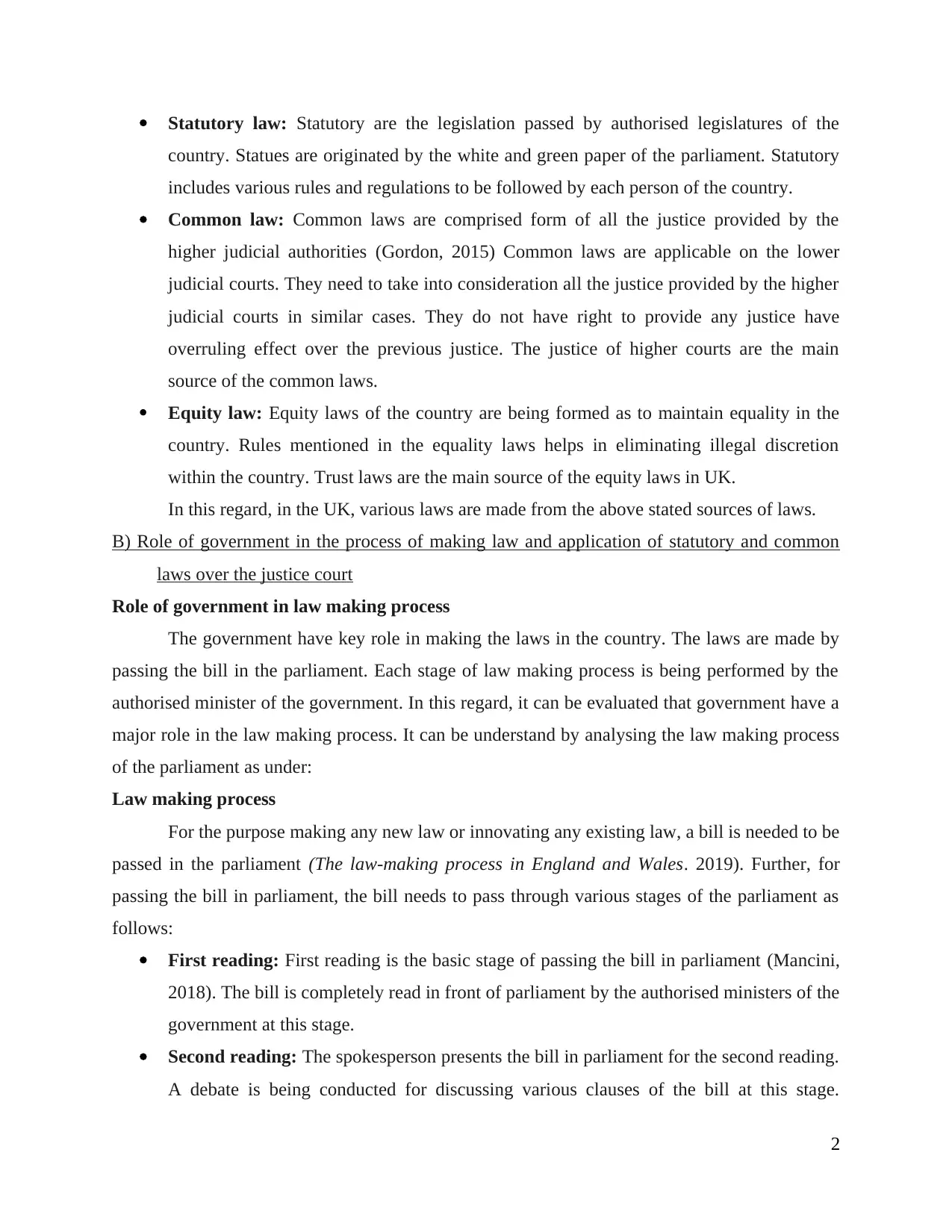
Statutory law: Statutory are the legislation passed by authorised legislatures of the
country. Statues are originated by the white and green paper of the parliament. Statutory
includes various rules and regulations to be followed by each person of the country.
Common law: Common laws are comprised form of all the justice provided by the
higher judicial authorities (Gordon, 2015) Common laws are applicable on the lower
judicial courts. They need to take into consideration all the justice provided by the higher
judicial courts in similar cases. They do not have right to provide any justice have
overruling effect over the previous justice. The justice of higher courts are the main
source of the common laws.
Equity law: Equity laws of the country are being formed as to maintain equality in the
country. Rules mentioned in the equality laws helps in eliminating illegal discretion
within the country. Trust laws are the main source of the equity laws in UK.
In this regard, in the UK, various laws are made from the above stated sources of laws.
B) Role of government in the process of making law and application of statutory and common
laws over the justice court
Role of government in law making process
The government have key role in making the laws in the country. The laws are made by
passing the bill in the parliament. Each stage of law making process is being performed by the
authorised minister of the government. In this regard, it can be evaluated that government have a
major role in the law making process. It can be understand by analysing the law making process
of the parliament as under:
Law making process
For the purpose making any new law or innovating any existing law, a bill is needed to be
passed in the parliament (The law-making process in England and Wales. 2019). Further, for
passing the bill in parliament, the bill needs to pass through various stages of the parliament as
follows:
First reading: First reading is the basic stage of passing the bill in parliament (Mancini,
2018). The bill is completely read in front of parliament by the authorised ministers of the
government at this stage.
Second reading: The spokesperson presents the bill in parliament for the second reading.
A debate is being conducted for discussing various clauses of the bill at this stage.
2
country. Statues are originated by the white and green paper of the parliament. Statutory
includes various rules and regulations to be followed by each person of the country.
Common law: Common laws are comprised form of all the justice provided by the
higher judicial authorities (Gordon, 2015) Common laws are applicable on the lower
judicial courts. They need to take into consideration all the justice provided by the higher
judicial courts in similar cases. They do not have right to provide any justice have
overruling effect over the previous justice. The justice of higher courts are the main
source of the common laws.
Equity law: Equity laws of the country are being formed as to maintain equality in the
country. Rules mentioned in the equality laws helps in eliminating illegal discretion
within the country. Trust laws are the main source of the equity laws in UK.
In this regard, in the UK, various laws are made from the above stated sources of laws.
B) Role of government in the process of making law and application of statutory and common
laws over the justice court
Role of government in law making process
The government have key role in making the laws in the country. The laws are made by
passing the bill in the parliament. Each stage of law making process is being performed by the
authorised minister of the government. In this regard, it can be evaluated that government have a
major role in the law making process. It can be understand by analysing the law making process
of the parliament as under:
Law making process
For the purpose making any new law or innovating any existing law, a bill is needed to be
passed in the parliament (The law-making process in England and Wales. 2019). Further, for
passing the bill in parliament, the bill needs to pass through various stages of the parliament as
follows:
First reading: First reading is the basic stage of passing the bill in parliament (Mancini,
2018). The bill is completely read in front of parliament by the authorised ministers of the
government at this stage.
Second reading: The spokesperson presents the bill in parliament for the second reading.
A debate is being conducted for discussing various clauses of the bill at this stage.
2
Paraphrase This Document
Need a fresh take? Get an instant paraphrase of this document with our AI Paraphraser
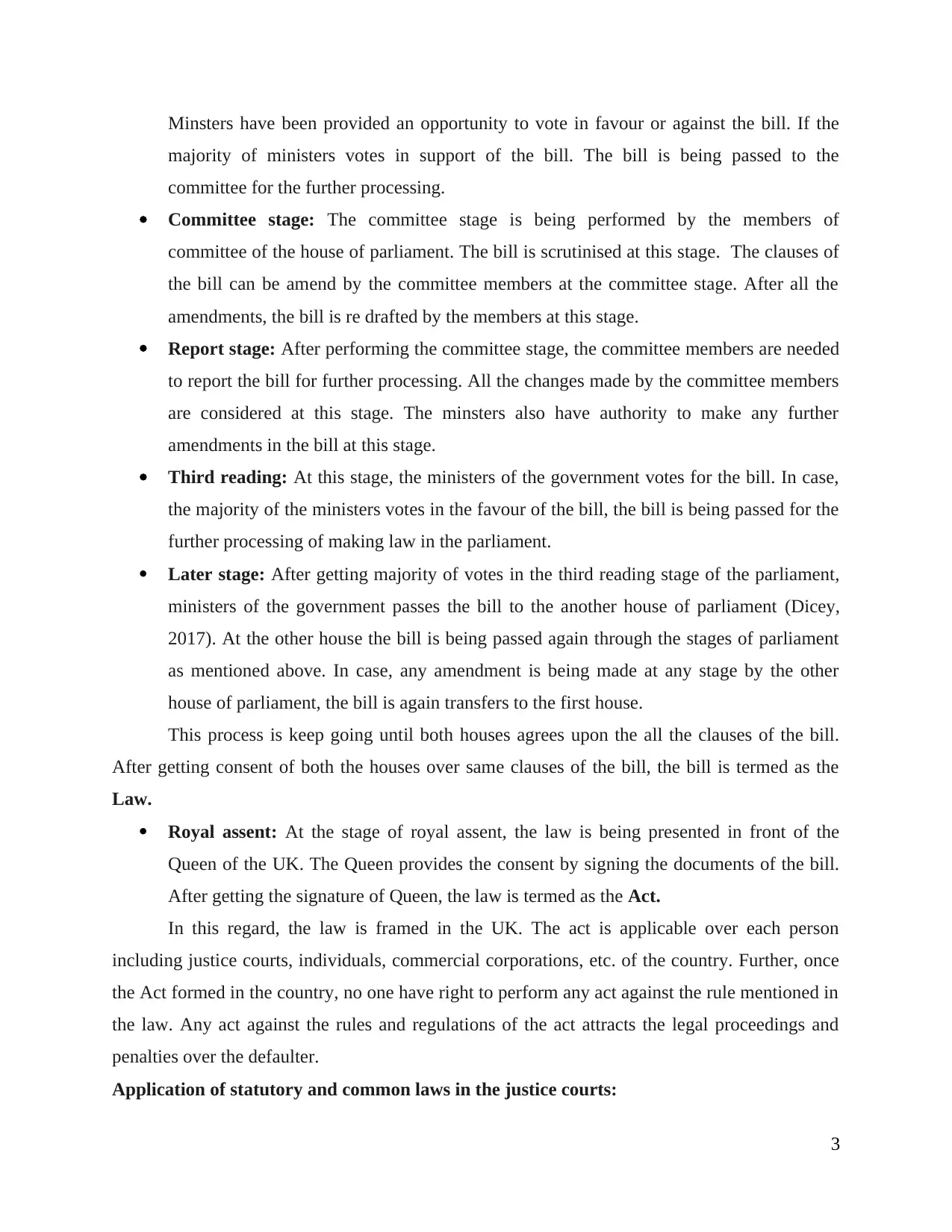
Minsters have been provided an opportunity to vote in favour or against the bill. If the
majority of ministers votes in support of the bill. The bill is being passed to the
committee for the further processing.
Committee stage: The committee stage is being performed by the members of
committee of the house of parliament. The bill is scrutinised at this stage. The clauses of
the bill can be amend by the committee members at the committee stage. After all the
amendments, the bill is re drafted by the members at this stage.
Report stage: After performing the committee stage, the committee members are needed
to report the bill for further processing. All the changes made by the committee members
are considered at this stage. The minsters also have authority to make any further
amendments in the bill at this stage.
Third reading: At this stage, the ministers of the government votes for the bill. In case,
the majority of the ministers votes in the favour of the bill, the bill is being passed for the
further processing of making law in the parliament.
Later stage: After getting majority of votes in the third reading stage of the parliament,
ministers of the government passes the bill to the another house of parliament (Dicey,
2017). At the other house the bill is being passed again through the stages of parliament
as mentioned above. In case, any amendment is being made at any stage by the other
house of parliament, the bill is again transfers to the first house.
This process is keep going until both houses agrees upon the all the clauses of the bill.
After getting consent of both the houses over same clauses of the bill, the bill is termed as the
Law.
Royal assent: At the stage of royal assent, the law is being presented in front of the
Queen of the UK. The Queen provides the consent by signing the documents of the bill.
After getting the signature of Queen, the law is termed as the Act.
In this regard, the law is framed in the UK. The act is applicable over each person
including justice courts, individuals, commercial corporations, etc. of the country. Further, once
the Act formed in the country, no one have right to perform any act against the rule mentioned in
the law. Any act against the rules and regulations of the act attracts the legal proceedings and
penalties over the defaulter.
Application of statutory and common laws in the justice courts:
3
majority of ministers votes in support of the bill. The bill is being passed to the
committee for the further processing.
Committee stage: The committee stage is being performed by the members of
committee of the house of parliament. The bill is scrutinised at this stage. The clauses of
the bill can be amend by the committee members at the committee stage. After all the
amendments, the bill is re drafted by the members at this stage.
Report stage: After performing the committee stage, the committee members are needed
to report the bill for further processing. All the changes made by the committee members
are considered at this stage. The minsters also have authority to make any further
amendments in the bill at this stage.
Third reading: At this stage, the ministers of the government votes for the bill. In case,
the majority of the ministers votes in the favour of the bill, the bill is being passed for the
further processing of making law in the parliament.
Later stage: After getting majority of votes in the third reading stage of the parliament,
ministers of the government passes the bill to the another house of parliament (Dicey,
2017). At the other house the bill is being passed again through the stages of parliament
as mentioned above. In case, any amendment is being made at any stage by the other
house of parliament, the bill is again transfers to the first house.
This process is keep going until both houses agrees upon the all the clauses of the bill.
After getting consent of both the houses over same clauses of the bill, the bill is termed as the
Law.
Royal assent: At the stage of royal assent, the law is being presented in front of the
Queen of the UK. The Queen provides the consent by signing the documents of the bill.
After getting the signature of Queen, the law is termed as the Act.
In this regard, the law is framed in the UK. The act is applicable over each person
including justice courts, individuals, commercial corporations, etc. of the country. Further, once
the Act formed in the country, no one have right to perform any act against the rule mentioned in
the law. Any act against the rules and regulations of the act attracts the legal proceedings and
penalties over the defaulter.
Application of statutory and common laws in the justice courts:
3
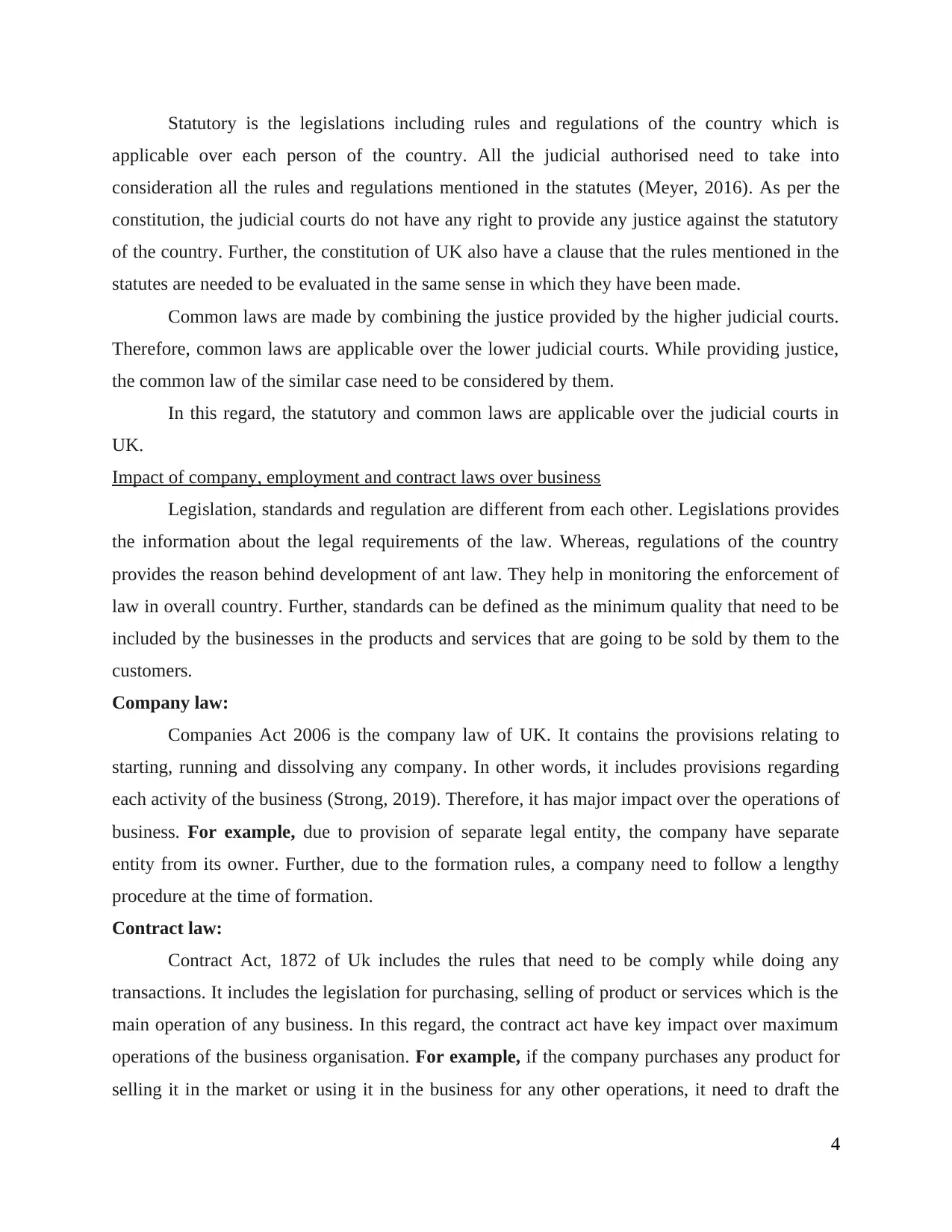
Statutory is the legislations including rules and regulations of the country which is
applicable over each person of the country. All the judicial authorised need to take into
consideration all the rules and regulations mentioned in the statutes (Meyer, 2016). As per the
constitution, the judicial courts do not have any right to provide any justice against the statutory
of the country. Further, the constitution of UK also have a clause that the rules mentioned in the
statutes are needed to be evaluated in the same sense in which they have been made.
Common laws are made by combining the justice provided by the higher judicial courts.
Therefore, common laws are applicable over the lower judicial courts. While providing justice,
the common law of the similar case need to be considered by them.
In this regard, the statutory and common laws are applicable over the judicial courts in
UK.
Impact of company, employment and contract laws over business
Legislation, standards and regulation are different from each other. Legislations provides
the information about the legal requirements of the law. Whereas, regulations of the country
provides the reason behind development of ant law. They help in monitoring the enforcement of
law in overall country. Further, standards can be defined as the minimum quality that need to be
included by the businesses in the products and services that are going to be sold by them to the
customers.
Company law:
Companies Act 2006 is the company law of UK. It contains the provisions relating to
starting, running and dissolving any company. In other words, it includes provisions regarding
each activity of the business (Strong, 2019). Therefore, it has major impact over the operations of
business. For example, due to provision of separate legal entity, the company have separate
entity from its owner. Further, due to the formation rules, a company need to follow a lengthy
procedure at the time of formation.
Contract law:
Contract Act, 1872 of Uk includes the rules that need to be comply while doing any
transactions. It includes the legislation for purchasing, selling of product or services which is the
main operation of any business. In this regard, the contract act have key impact over maximum
operations of the business organisation. For example, if the company purchases any product for
selling it in the market or using it in the business for any other operations, it need to draft the
4
applicable over each person of the country. All the judicial authorised need to take into
consideration all the rules and regulations mentioned in the statutes (Meyer, 2016). As per the
constitution, the judicial courts do not have any right to provide any justice against the statutory
of the country. Further, the constitution of UK also have a clause that the rules mentioned in the
statutes are needed to be evaluated in the same sense in which they have been made.
Common laws are made by combining the justice provided by the higher judicial courts.
Therefore, common laws are applicable over the lower judicial courts. While providing justice,
the common law of the similar case need to be considered by them.
In this regard, the statutory and common laws are applicable over the judicial courts in
UK.
Impact of company, employment and contract laws over business
Legislation, standards and regulation are different from each other. Legislations provides
the information about the legal requirements of the law. Whereas, regulations of the country
provides the reason behind development of ant law. They help in monitoring the enforcement of
law in overall country. Further, standards can be defined as the minimum quality that need to be
included by the businesses in the products and services that are going to be sold by them to the
customers.
Company law:
Companies Act 2006 is the company law of UK. It contains the provisions relating to
starting, running and dissolving any company. In other words, it includes provisions regarding
each activity of the business (Strong, 2019). Therefore, it has major impact over the operations of
business. For example, due to provision of separate legal entity, the company have separate
entity from its owner. Further, due to the formation rules, a company need to follow a lengthy
procedure at the time of formation.
Contract law:
Contract Act, 1872 of Uk includes the rules that need to be comply while doing any
transactions. It includes the legislation for purchasing, selling of product or services which is the
main operation of any business. In this regard, the contract act have key impact over maximum
operations of the business organisation. For example, if the company purchases any product for
selling it in the market or using it in the business for any other operations, it need to draft the
4
⊘ This is a preview!⊘
Do you want full access?
Subscribe today to unlock all pages.

Trusted by 1+ million students worldwide
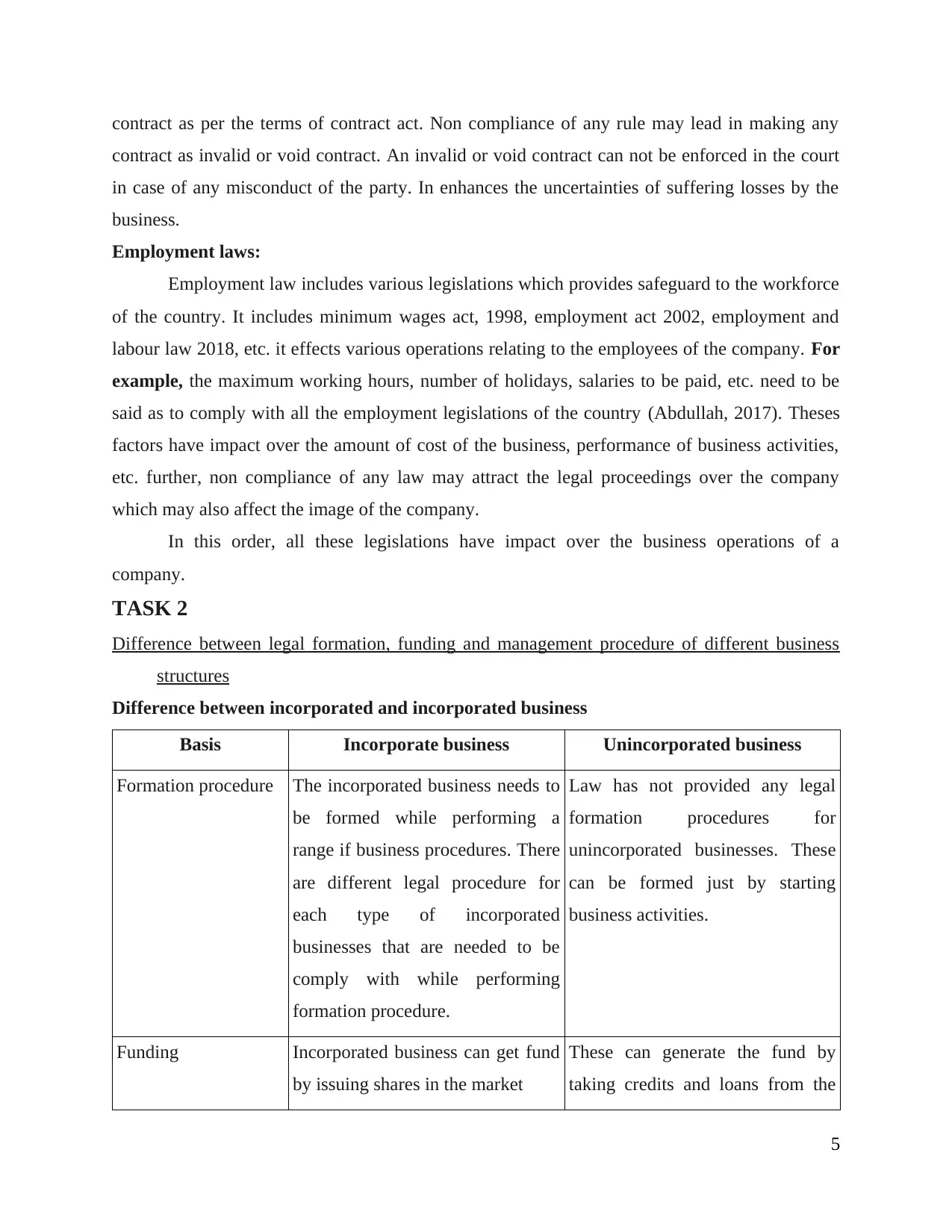
contract as per the terms of contract act. Non compliance of any rule may lead in making any
contract as invalid or void contract. An invalid or void contract can not be enforced in the court
in case of any misconduct of the party. In enhances the uncertainties of suffering losses by the
business.
Employment laws:
Employment law includes various legislations which provides safeguard to the workforce
of the country. It includes minimum wages act, 1998, employment act 2002, employment and
labour law 2018, etc. it effects various operations relating to the employees of the company. For
example, the maximum working hours, number of holidays, salaries to be paid, etc. need to be
said as to comply with all the employment legislations of the country (Abdullah, 2017). Theses
factors have impact over the amount of cost of the business, performance of business activities,
etc. further, non compliance of any law may attract the legal proceedings over the company
which may also affect the image of the company.
In this order, all these legislations have impact over the business operations of a
company.
TASK 2
Difference between legal formation, funding and management procedure of different business
structures
Difference between incorporated and incorporated business
Basis Incorporate business Unincorporated business
Formation procedure The incorporated business needs to
be formed while performing a
range if business procedures. There
are different legal procedure for
each type of incorporated
businesses that are needed to be
comply with while performing
formation procedure.
Law has not provided any legal
formation procedures for
unincorporated businesses. These
can be formed just by starting
business activities.
Funding Incorporated business can get fund
by issuing shares in the market
These can generate the fund by
taking credits and loans from the
5
contract as invalid or void contract. An invalid or void contract can not be enforced in the court
in case of any misconduct of the party. In enhances the uncertainties of suffering losses by the
business.
Employment laws:
Employment law includes various legislations which provides safeguard to the workforce
of the country. It includes minimum wages act, 1998, employment act 2002, employment and
labour law 2018, etc. it effects various operations relating to the employees of the company. For
example, the maximum working hours, number of holidays, salaries to be paid, etc. need to be
said as to comply with all the employment legislations of the country (Abdullah, 2017). Theses
factors have impact over the amount of cost of the business, performance of business activities,
etc. further, non compliance of any law may attract the legal proceedings over the company
which may also affect the image of the company.
In this order, all these legislations have impact over the business operations of a
company.
TASK 2
Difference between legal formation, funding and management procedure of different business
structures
Difference between incorporated and incorporated business
Basis Incorporate business Unincorporated business
Formation procedure The incorporated business needs to
be formed while performing a
range if business procedures. There
are different legal procedure for
each type of incorporated
businesses that are needed to be
comply with while performing
formation procedure.
Law has not provided any legal
formation procedures for
unincorporated businesses. These
can be formed just by starting
business activities.
Funding Incorporated business can get fund
by issuing shares in the market
These can generate the fund by
taking credits and loans from the
5
Paraphrase This Document
Need a fresh take? Get an instant paraphrase of this document with our AI Paraphraser
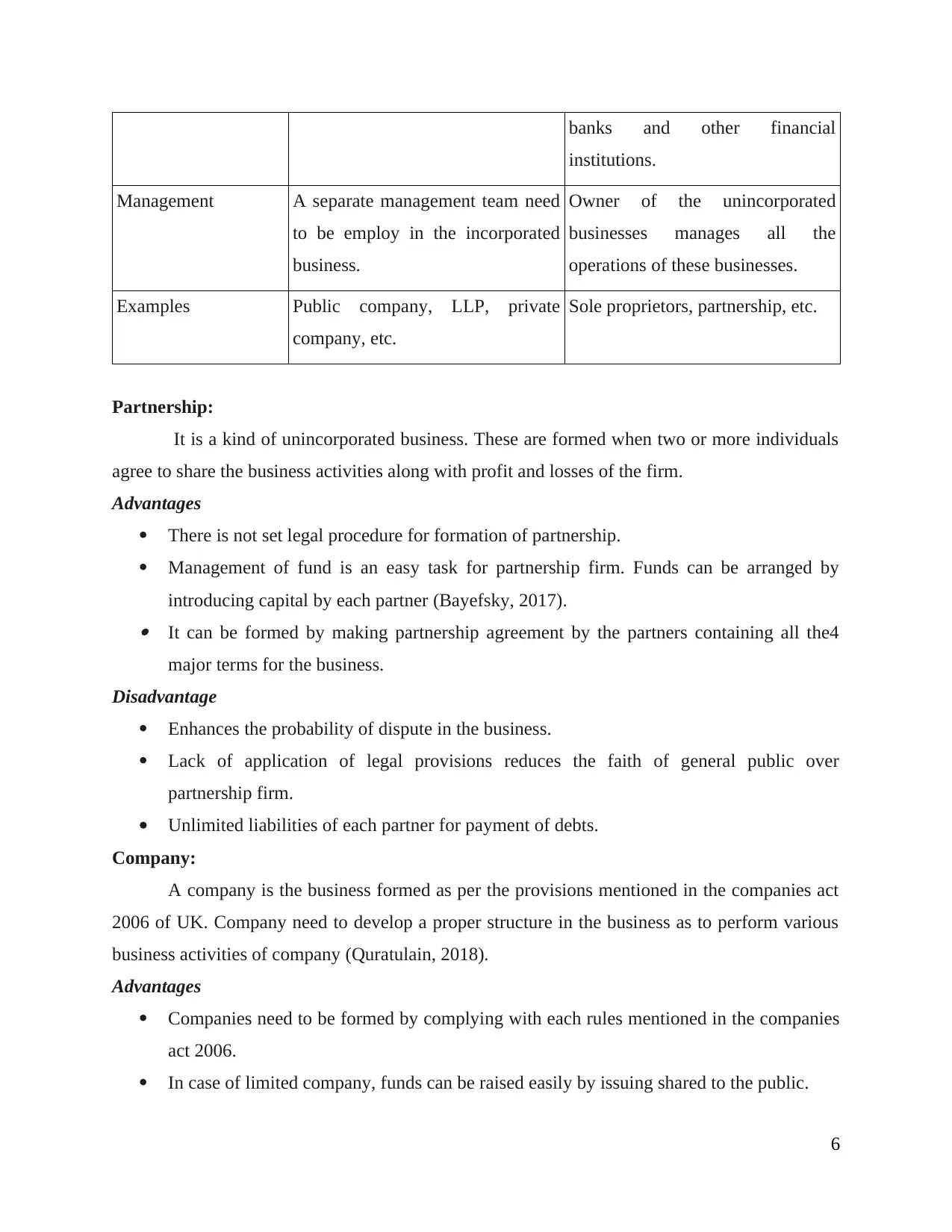
banks and other financial
institutions.
Management A separate management team need
to be employ in the incorporated
business.
Owner of the unincorporated
businesses manages all the
operations of these businesses.
Examples Public company, LLP, private
company, etc.
Sole proprietors, partnership, etc.
Partnership:
It is a kind of unincorporated business. These are formed when two or more individuals
agree to share the business activities along with profit and losses of the firm.
Advantages
There is not set legal procedure for formation of partnership.
Management of fund is an easy task for partnership firm. Funds can be arranged by
introducing capital by each partner (Bayefsky, 2017). It can be formed by making partnership agreement by the partners containing all the4
major terms for the business.
Disadvantage
Enhances the probability of dispute in the business.
Lack of application of legal provisions reduces the faith of general public over
partnership firm.
Unlimited liabilities of each partner for payment of debts.
Company:
A company is the business formed as per the provisions mentioned in the companies act
2006 of UK. Company need to develop a proper structure in the business as to perform various
business activities of company (Quratulain, 2018).
Advantages
Companies need to be formed by complying with each rules mentioned in the companies
act 2006.
In case of limited company, funds can be raised easily by issuing shared to the public.
6
institutions.
Management A separate management team need
to be employ in the incorporated
business.
Owner of the unincorporated
businesses manages all the
operations of these businesses.
Examples Public company, LLP, private
company, etc.
Sole proprietors, partnership, etc.
Partnership:
It is a kind of unincorporated business. These are formed when two or more individuals
agree to share the business activities along with profit and losses of the firm.
Advantages
There is not set legal procedure for formation of partnership.
Management of fund is an easy task for partnership firm. Funds can be arranged by
introducing capital by each partner (Bayefsky, 2017). It can be formed by making partnership agreement by the partners containing all the4
major terms for the business.
Disadvantage
Enhances the probability of dispute in the business.
Lack of application of legal provisions reduces the faith of general public over
partnership firm.
Unlimited liabilities of each partner for payment of debts.
Company:
A company is the business formed as per the provisions mentioned in the companies act
2006 of UK. Company need to develop a proper structure in the business as to perform various
business activities of company (Quratulain, 2018).
Advantages
Companies need to be formed by complying with each rules mentioned in the companies
act 2006.
In case of limited company, funds can be raised easily by issuing shared to the public.
6
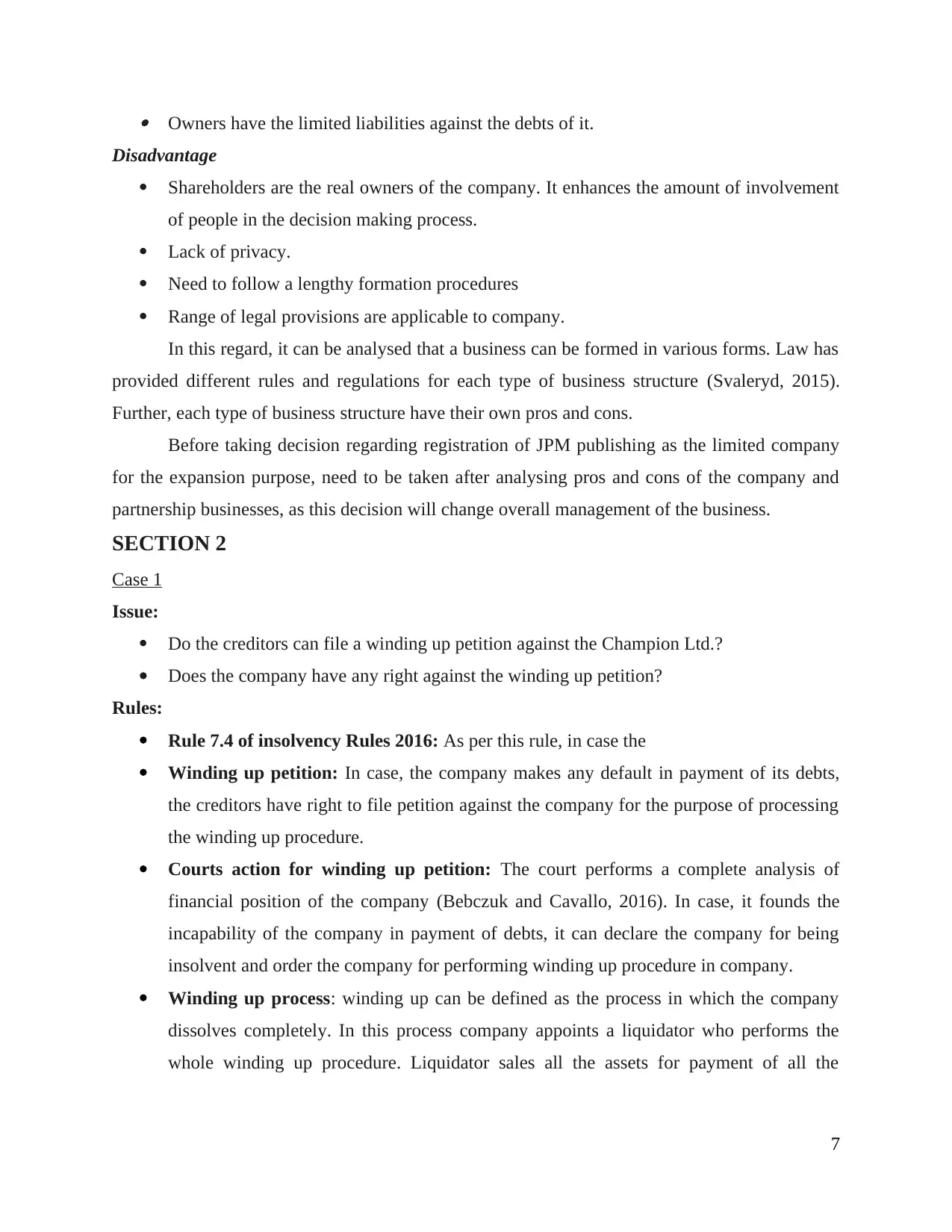
Owners have the limited liabilities against the debts of it.
Disadvantage
Shareholders are the real owners of the company. It enhances the amount of involvement
of people in the decision making process.
Lack of privacy.
Need to follow a lengthy formation procedures
Range of legal provisions are applicable to company.
In this regard, it can be analysed that a business can be formed in various forms. Law has
provided different rules and regulations for each type of business structure (Svaleryd, 2015).
Further, each type of business structure have their own pros and cons.
Before taking decision regarding registration of JPM publishing as the limited company
for the expansion purpose, need to be taken after analysing pros and cons of the company and
partnership businesses, as this decision will change overall management of the business.
SECTION 2
Case 1
Issue:
Do the creditors can file a winding up petition against the Champion Ltd.?
Does the company have any right against the winding up petition?
Rules:
Rule 7.4 of insolvency Rules 2016: As per this rule, in case the
Winding up petition: In case, the company makes any default in payment of its debts,
the creditors have right to file petition against the company for the purpose of processing
the winding up procedure.
Courts action for winding up petition: The court performs a complete analysis of
financial position of the company (Bebczuk and Cavallo, 2016). In case, it founds the
incapability of the company in payment of debts, it can declare the company for being
insolvent and order the company for performing winding up procedure in company.
Winding up process: winding up can be defined as the process in which the company
dissolves completely. In this process company appoints a liquidator who performs the
whole winding up procedure. Liquidator sales all the assets for payment of all the
7
Disadvantage
Shareholders are the real owners of the company. It enhances the amount of involvement
of people in the decision making process.
Lack of privacy.
Need to follow a lengthy formation procedures
Range of legal provisions are applicable to company.
In this regard, it can be analysed that a business can be formed in various forms. Law has
provided different rules and regulations for each type of business structure (Svaleryd, 2015).
Further, each type of business structure have their own pros and cons.
Before taking decision regarding registration of JPM publishing as the limited company
for the expansion purpose, need to be taken after analysing pros and cons of the company and
partnership businesses, as this decision will change overall management of the business.
SECTION 2
Case 1
Issue:
Do the creditors can file a winding up petition against the Champion Ltd.?
Does the company have any right against the winding up petition?
Rules:
Rule 7.4 of insolvency Rules 2016: As per this rule, in case the
Winding up petition: In case, the company makes any default in payment of its debts,
the creditors have right to file petition against the company for the purpose of processing
the winding up procedure.
Courts action for winding up petition: The court performs a complete analysis of
financial position of the company (Bebczuk and Cavallo, 2016). In case, it founds the
incapability of the company in payment of debts, it can declare the company for being
insolvent and order the company for performing winding up procedure in company.
Winding up process: winding up can be defined as the process in which the company
dissolves completely. In this process company appoints a liquidator who performs the
whole winding up procedure. Liquidator sales all the assets for payment of all the
7
⊘ This is a preview!⊘
Do you want full access?
Subscribe today to unlock all pages.

Trusted by 1+ million students worldwide
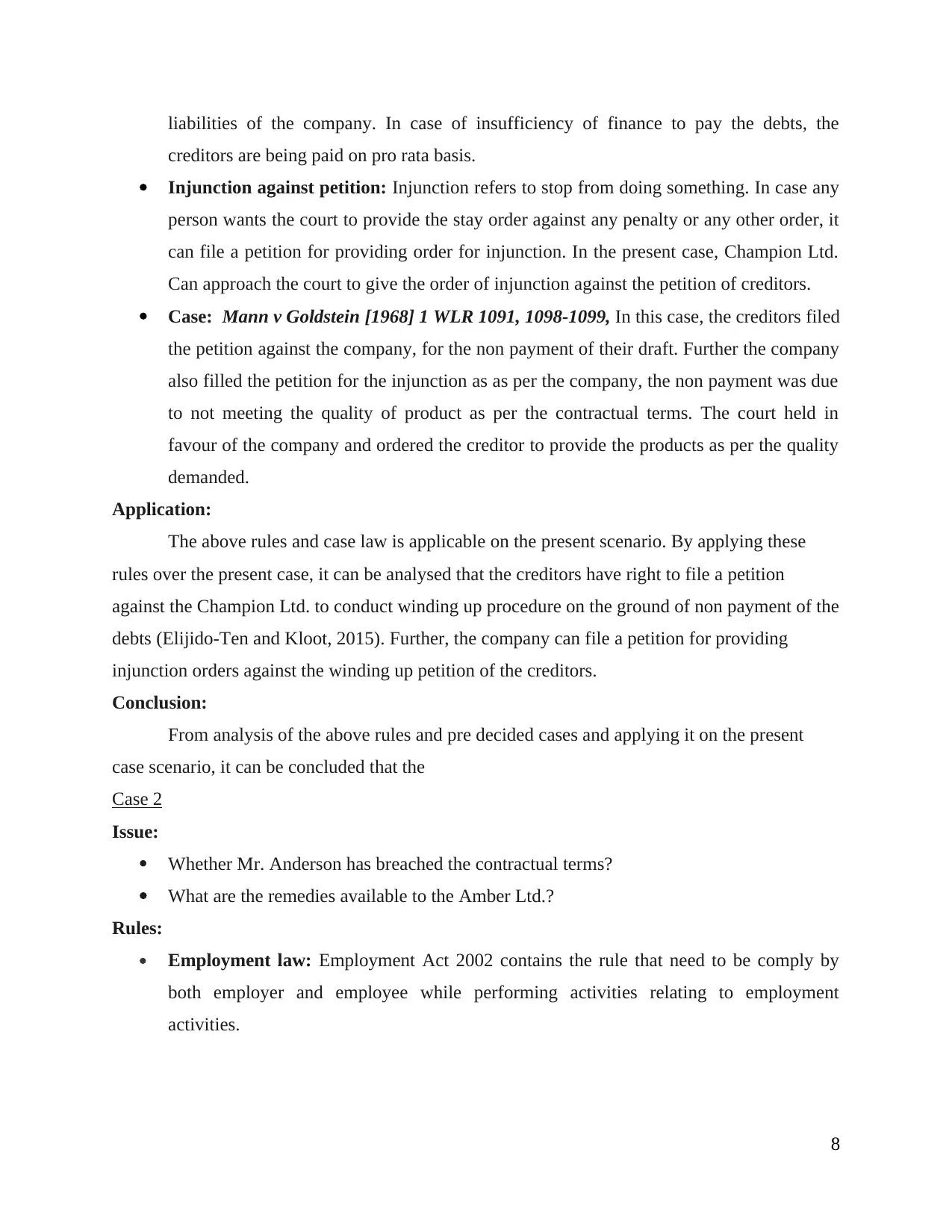
liabilities of the company. In case of insufficiency of finance to pay the debts, the
creditors are being paid on pro rata basis.
Injunction against petition: Injunction refers to stop from doing something. In case any
person wants the court to provide the stay order against any penalty or any other order, it
can file a petition for providing order for injunction. In the present case, Champion Ltd.
Can approach the court to give the order of injunction against the petition of creditors.
Case: Mann v Goldstein [1968] 1 WLR 1091, 1098-1099, In this case, the creditors filed
the petition against the company, for the non payment of their draft. Further the company
also filled the petition for the injunction as as per the company, the non payment was due
to not meeting the quality of product as per the contractual terms. The court held in
favour of the company and ordered the creditor to provide the products as per the quality
demanded.
Application:
The above rules and case law is applicable on the present scenario. By applying these
rules over the present case, it can be analysed that the creditors have right to file a petition
against the Champion Ltd. to conduct winding up procedure on the ground of non payment of the
debts (Elijido-Ten and Kloot, 2015). Further, the company can file a petition for providing
injunction orders against the winding up petition of the creditors.
Conclusion:
From analysis of the above rules and pre decided cases and applying it on the present
case scenario, it can be concluded that the
Case 2
Issue:
Whether Mr. Anderson has breached the contractual terms?
What are the remedies available to the Amber Ltd.?
Rules:
Employment law: Employment Act 2002 contains the rule that need to be comply by
both employer and employee while performing activities relating to employment
activities.
8
creditors are being paid on pro rata basis.
Injunction against petition: Injunction refers to stop from doing something. In case any
person wants the court to provide the stay order against any penalty or any other order, it
can file a petition for providing order for injunction. In the present case, Champion Ltd.
Can approach the court to give the order of injunction against the petition of creditors.
Case: Mann v Goldstein [1968] 1 WLR 1091, 1098-1099, In this case, the creditors filed
the petition against the company, for the non payment of their draft. Further the company
also filled the petition for the injunction as as per the company, the non payment was due
to not meeting the quality of product as per the contractual terms. The court held in
favour of the company and ordered the creditor to provide the products as per the quality
demanded.
Application:
The above rules and case law is applicable on the present scenario. By applying these
rules over the present case, it can be analysed that the creditors have right to file a petition
against the Champion Ltd. to conduct winding up procedure on the ground of non payment of the
debts (Elijido-Ten and Kloot, 2015). Further, the company can file a petition for providing
injunction orders against the winding up petition of the creditors.
Conclusion:
From analysis of the above rules and pre decided cases and applying it on the present
case scenario, it can be concluded that the
Case 2
Issue:
Whether Mr. Anderson has breached the contractual terms?
What are the remedies available to the Amber Ltd.?
Rules:
Employment law: Employment Act 2002 contains the rule that need to be comply by
both employer and employee while performing activities relating to employment
activities.
8
Paraphrase This Document
Need a fresh take? Get an instant paraphrase of this document with our AI Paraphraser
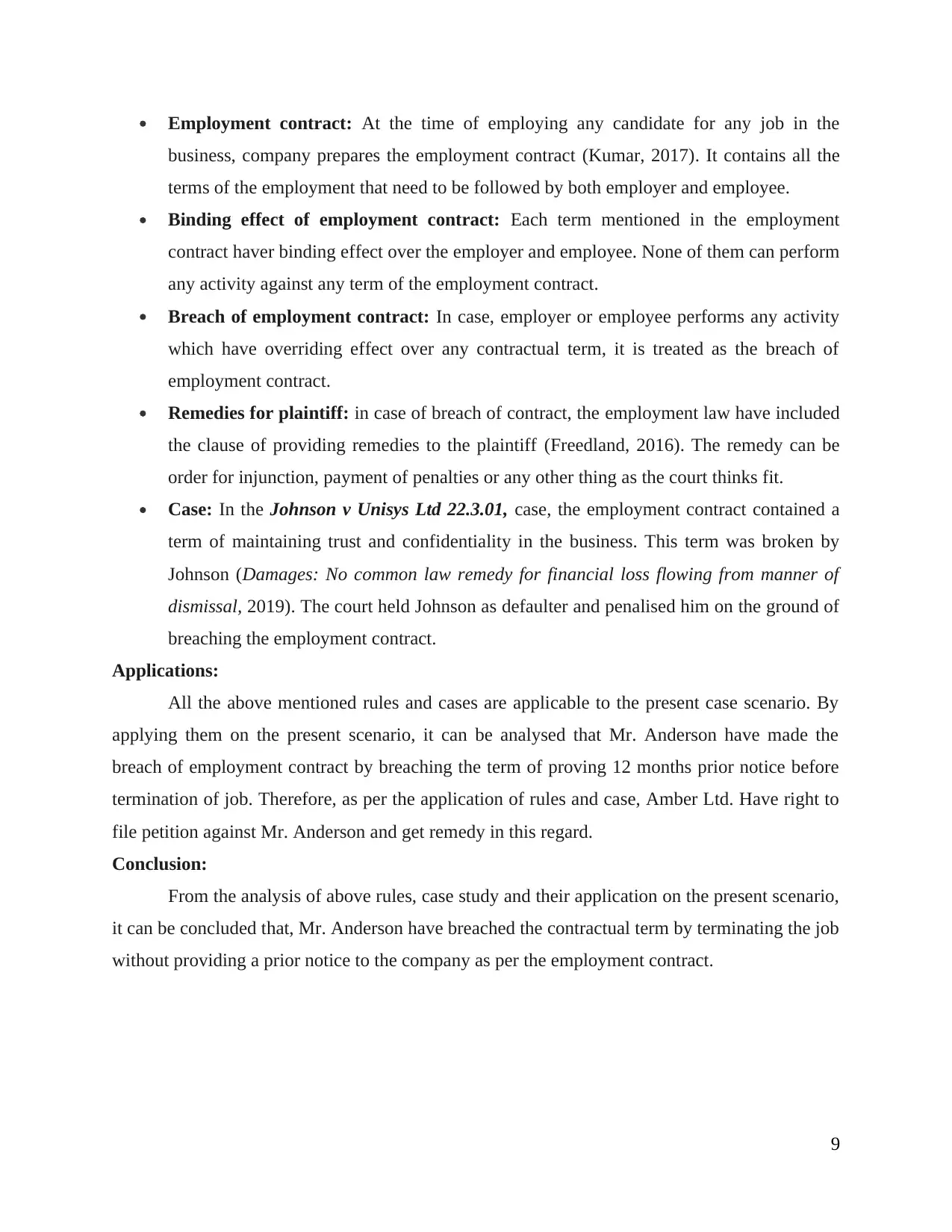
Employment contract: At the time of employing any candidate for any job in the
business, company prepares the employment contract (Kumar, 2017). It contains all the
terms of the employment that need to be followed by both employer and employee.
Binding effect of employment contract: Each term mentioned in the employment
contract haver binding effect over the employer and employee. None of them can perform
any activity against any term of the employment contract.
Breach of employment contract: In case, employer or employee performs any activity
which have overriding effect over any contractual term, it is treated as the breach of
employment contract.
Remedies for plaintiff: in case of breach of contract, the employment law have included
the clause of providing remedies to the plaintiff (Freedland, 2016). The remedy can be
order for injunction, payment of penalties or any other thing as the court thinks fit.
Case: In the Johnson v Unisys Ltd 22.3.01, case, the employment contract contained a
term of maintaining trust and confidentiality in the business. This term was broken by
Johnson (Damages: No common law remedy for financial loss flowing from manner of
dismissal, 2019). The court held Johnson as defaulter and penalised him on the ground of
breaching the employment contract.
Applications:
All the above mentioned rules and cases are applicable to the present case scenario. By
applying them on the present scenario, it can be analysed that Mr. Anderson have made the
breach of employment contract by breaching the term of proving 12 months prior notice before
termination of job. Therefore, as per the application of rules and case, Amber Ltd. Have right to
file petition against Mr. Anderson and get remedy in this regard.
Conclusion:
From the analysis of above rules, case study and their application on the present scenario,
it can be concluded that, Mr. Anderson have breached the contractual term by terminating the job
without providing a prior notice to the company as per the employment contract.
9
business, company prepares the employment contract (Kumar, 2017). It contains all the
terms of the employment that need to be followed by both employer and employee.
Binding effect of employment contract: Each term mentioned in the employment
contract haver binding effect over the employer and employee. None of them can perform
any activity against any term of the employment contract.
Breach of employment contract: In case, employer or employee performs any activity
which have overriding effect over any contractual term, it is treated as the breach of
employment contract.
Remedies for plaintiff: in case of breach of contract, the employment law have included
the clause of providing remedies to the plaintiff (Freedland, 2016). The remedy can be
order for injunction, payment of penalties or any other thing as the court thinks fit.
Case: In the Johnson v Unisys Ltd 22.3.01, case, the employment contract contained a
term of maintaining trust and confidentiality in the business. This term was broken by
Johnson (Damages: No common law remedy for financial loss flowing from manner of
dismissal, 2019). The court held Johnson as defaulter and penalised him on the ground of
breaching the employment contract.
Applications:
All the above mentioned rules and cases are applicable to the present case scenario. By
applying them on the present scenario, it can be analysed that Mr. Anderson have made the
breach of employment contract by breaching the term of proving 12 months prior notice before
termination of job. Therefore, as per the application of rules and case, Amber Ltd. Have right to
file petition against Mr. Anderson and get remedy in this regard.
Conclusion:
From the analysis of above rules, case study and their application on the present scenario,
it can be concluded that, Mr. Anderson have breached the contractual term by terminating the job
without providing a prior notice to the company as per the employment contract.
9
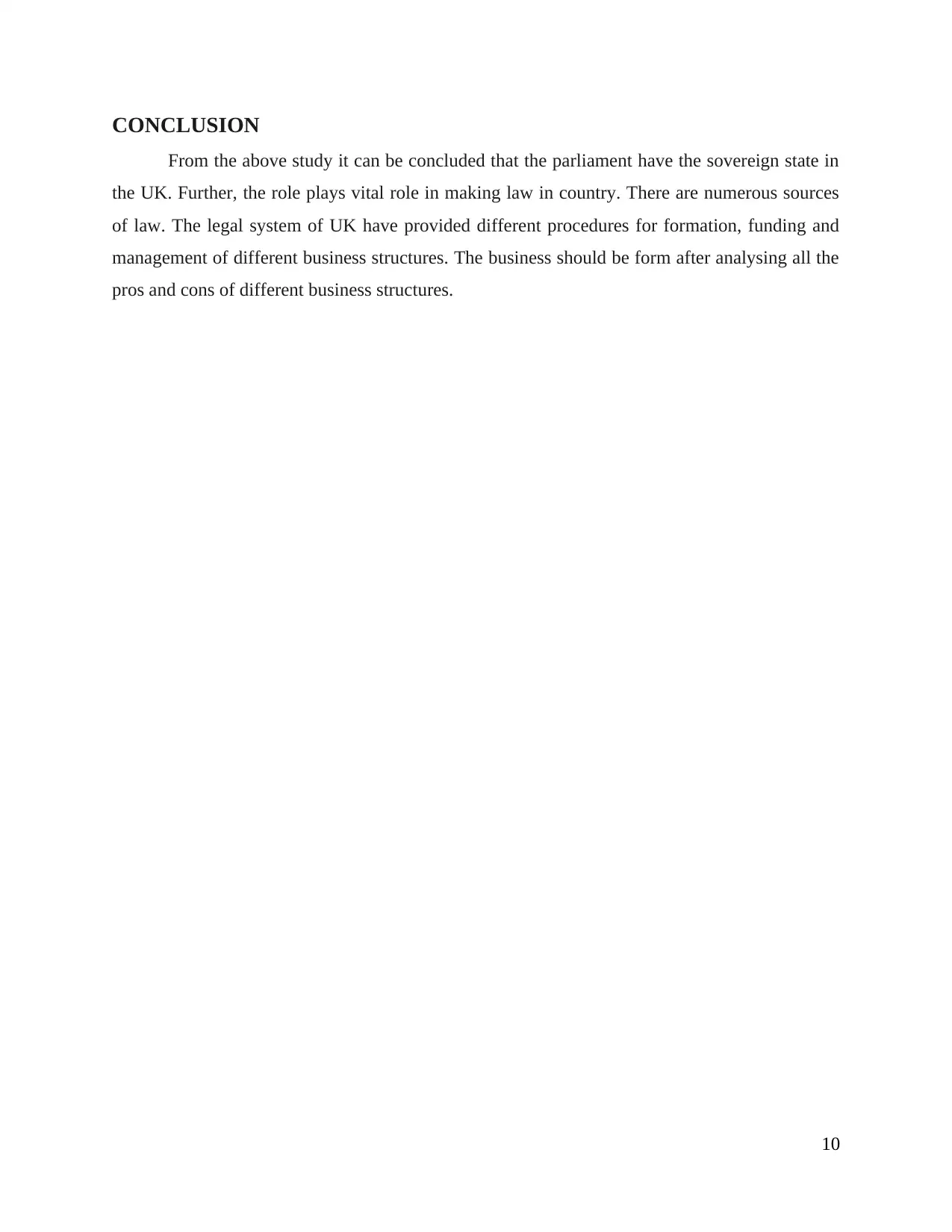
CONCLUSION
From the above study it can be concluded that the parliament have the sovereign state in
the UK. Further, the role plays vital role in making law in country. There are numerous sources
of law. The legal system of UK have provided different procedures for formation, funding and
management of different business structures. The business should be form after analysing all the
pros and cons of different business structures.
10
From the above study it can be concluded that the parliament have the sovereign state in
the UK. Further, the role plays vital role in making law in country. There are numerous sources
of law. The legal system of UK have provided different procedures for formation, funding and
management of different business structures. The business should be form after analysing all the
pros and cons of different business structures.
10
⊘ This is a preview!⊘
Do you want full access?
Subscribe today to unlock all pages.

Trusted by 1+ million students worldwide
1 out of 14
Related Documents
Your All-in-One AI-Powered Toolkit for Academic Success.
+13062052269
info@desklib.com
Available 24*7 on WhatsApp / Email
![[object Object]](/_next/static/media/star-bottom.7253800d.svg)
Unlock your academic potential
Copyright © 2020–2026 A2Z Services. All Rights Reserved. Developed and managed by ZUCOL.





